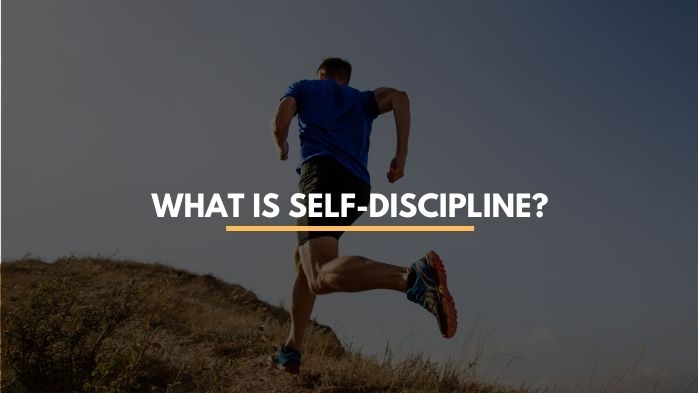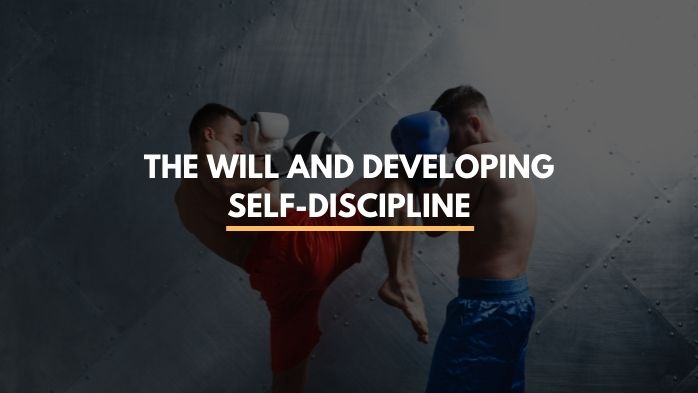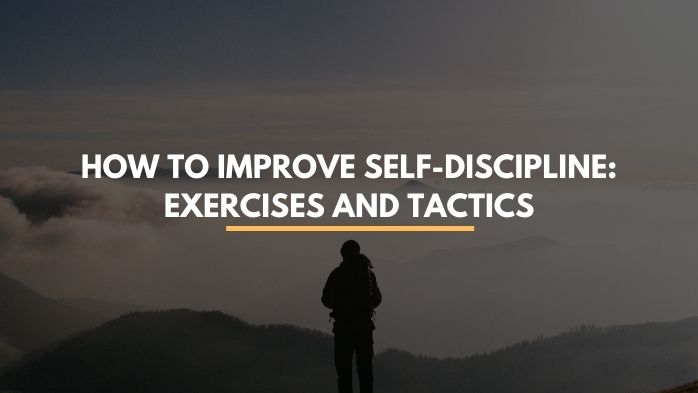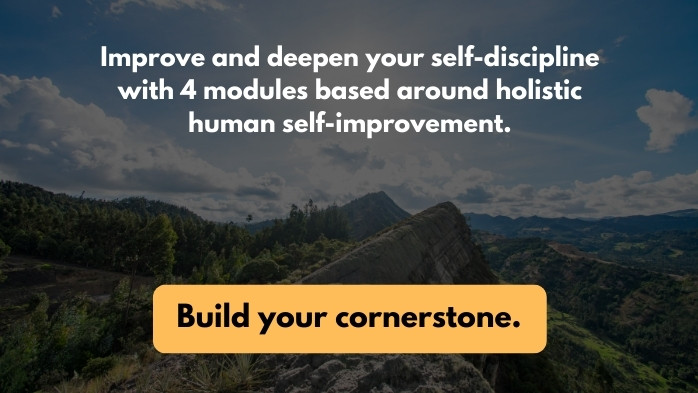How To Develop Rock Solid Self-Discipline
If you were to ask someone what “the crown jewel” of life is, you’ll probably get differing responses.
Some might say it’s a robust family system where people feel supported. Others might say a dynamic career. Others still will say high levels of personal financial capital.
While all of these are good and even great, they are impossible to achieve without the real crown jewel of life — self discipline.
Without moderate levels of self-discipline, most success and achievement will be out of your grasp.
Here’s an in-depth look at how to develop this important yet seemingly elusive skill and character trait.
The Shining Light of Civilization

“Discipline is what you must have to resist the lure of excuses.” – Brian Tracy, No Excuses: The Power of Self-Discipline
I want to start this off by saying: civilization and society are built off of delayed gratification.
Everything you see around you – cutting edge businesses, masterful architectural wonders, dazzling works of art, technological prowess, all of them are products of self-discipline on a macro scale.
On the micro level, your ability to reap and enjoy the fruits of your own labor (and that of others) will be almost proportional to the amount of self-discipline and self-management you’ve built up in your lifestyle (though not always, there are exceptions to this).
In other words, success, fulfillment, and pure happiness is pretty much impossible without self discipline.
What Is Self Discipline Exactly? (the Definition of Self-Discipline)

And because of this, self discipline and how to develop it is a topic that has consumed and engaged the most brilliant minds in history, so it’s something worth exploring.
My personal definition of self discipline is:
the act of corralling and marshaling your emotions, behavior, and mental resources to achieve a goal or intention that would not be achieved in the absence of this intention.
Viewing life through this lens, this is virtually everything good that exists in life.
An individual starts bumping up against the bad things in society when they lack self discipline in various areas. Some examples:
- Lack of money for emergencies when a person spends instead of saves
- Sleep deprivation or other health problems when a person chronically goes to bed late or eats a bad die
- An infection or accidental pregnancy when an individual or couple doesn’t practice birth control
All of these things come when a person does not direct their emotional and/or mental resources to planning and doing things that automatically do not occur in the absence of such planning.
Conversely, an individual is rewarded when they exercise self discipline:
- Going through 4 years of undergraduate education and coming out with a degree
- Consistently saving money from day one when they start working and then becoming an eventual millionaire
- Deciding to go to the gym on days when you don’t “feel like it” and sculpting a chiseled body.
The things that “don’t come natural” become things that push you closer towards rewards because they are things that civilization values.
The saying “if it was easy, everyone would be doing it” exists for a reason.
Developing Self Discipline: The Importance of the Will

In the absence of self-discipline, there’s chaos. That much has been established. But what is the driving engine behind self-discipline?
It’s human imagination and quite frankly, the will.
Without any strong environmental shapers of behavior, the human will is the most important factor in developing self-discipline.
It is the “pushing” locomotive force behind doing any thing of any consequence. Before an activity that has value is a habit, it must first be consciously exercised. This is the role of the will or the conscious mind.
The Will and the Prefrontal Cortex
As a human, you can accomplish a lot – especially if you set your mind to it. And it’s all because of the prefrontal cortex.
This portion of your brain is the seat of the rational, conscious mind.
Without this area of the brain, you would essentially be an animal because at the end of the day, that’s what humans are.
I personally believe humans are more than “just animals” but in this context, there is very little separating you from an animal that acts on instinct with the exception of your mind power.
These skills that make us function in society, we have to learn them. We don’t automatically know them when we’re born.
The Prefrontal Cortex and Working Memory
The prefrontal cortex is also the seat of your ability to focus and the seat of what is known as working memory.
Your working memory is responsible for temporarily holding information and organizing it based on priorities and what is going on in your environment.
With a strong working memory, you’re able to accomplish tasks, prioritize, plan, establish self-control, and in general, get things done.
When you think of someone who has good time management skills and “has their act together”, chances are that they have an excellent working memory.
They have good impulse control. They have good prioritization.
So from understanding this, the prefrontal cortex is…quite important, right?
The Punchline of the Prefrontal Cortex
Nature’s punchline is that it is THE LAST area of the brain to develop and also the weakest area of the brain.
Your limbic brain, your subconscious is 100x, a 1000x, a million times more powerful than your conscious mind, your prefrontal cortex.
But the prefrontal cortex is the rider at the head of the brain, which means when it is fully realized, it directs the subconscious.
And if that area is under-active and not fully developed – you won’t be able to access the top end of your willpower.
This is such the case for people who are under the age of 25 or even under the age of 30 in many cases, especially when it comes to guys.
This is pretty much why adolescents and young adults (especially males) act like idiots, lack empathy, and enjoy “taking the easy way out”.
In the interim, to close that gap, socialization AKA habits are intended to help a young child or adolescent act in a way that helps them give value to others.
They literally do not have the hardware to make decisions that they have rationally thought about.
That’s why whenever you see a well-behaved child or someone who is a teenager and they get good grades, they know how to practice delayed gratification, or someone who is just generally well-mannered – usually, 9 times out of 10 – that person was just “raised right”.
Their parents disciplined them over and over again a certain way to make acting in a manner that is palatable to society – a habit.
This may or may not be influenced by their own inbuilt personality (some kids are more easy to discipline than others and if you’re a parent, you know that) and temperament, but regardless – it is something that they were taught.
And it is now a habitual way of acting for them.
This is also why you see people in their teenage years to 20s start sort of “breaking rank” against their upbringing. Not always in a bad way, but because they now have enough prefrontal cortex activity to question their upbringing and develop their own opinions on things.
Then you’ll find that they eventually come back to the way they were raised or they will keep some parts of the way they were raised and discard others that don’t suite them.
So to come back all the way to the reason why I said asking “how do I get more disciplined” is sort of an inane question – is because is primarily neurological.
An Easy Way to Think About the Prefrontal Cortex
The better your prefrontal cortex functions, the more you will be able to exercise will.
The more you exercise your will AKA your conscious mind, the more you will be able to do difficult but beneficial things AKA exercising self-discipline.
The more you do difficult but beneficial things, the more it becomes a habit.
And the more it becomes a habit, the more it becomes just who you are.
So to me…that makes sense.
So in essence, we’re not really talking about exercising an intangible quality, we are really talking about how to make our brains stronger and practice managing ourselves.
Because if you’re past school age and you didn’t learn self-discipline for whatever reason, you now have to build this into yourself.
And I suspect that is the case for some people.
So now that we understand what we’re dealing with here, let’s look at some ways of building this into ourselves.
How to Improve Self-Discipline: Exercises and Tactics

I will say – the act of building self-discipline into yourself may very well be one of the most challenging things you will ever do, but easily one of the most rewarding things.
Because like I said, we are dealing with neurochemistry and neurology here.
And while I am not an expert in either of these things, I do have some ways in which I have been able to use these things to help myself become a strong individual.
So here are some of those things.
Learn How to Break Bad Habits
The elimination of bad habits is simple, but not easy. There is the simple (go long periods of time without engaging in specific behaviors in order to limit its strength in long-term memory) and not easy (you’ll also have to manage boredom, forgetfulness, fatigue, negative emotions, and so on depending on how strenuous and excruciating the habit you want to eliminate is).
There is an art and science to breaking bad habits.
Break your bad habits 👉 here.
Outline Clear Objectives
It’s hard to get excited about the journey when the destination is unclear. This is why establishing goals and clear objectives for achievement helps self-discipline move along.
On a day to day basis, this is a simple to-do list. On longer time lines like a month or a quarter, this is a set of objectives or goals that the smaller to-dos will feed into.
One way you can start goal achievement for the month is by planning your week. Once you visualize and set in stone your week, you’ll be much better off seeing what the month or even the year looks like.
But sticking low to the ground on a day to day level, doing things on the to-do list is where it starts.
Let’s say you want to clean your house.
Break that down into smaller parts.
You clean one room, then the next, then the next.
You may have to vacuum, dust, etc.
Clearly outline what is required for that task to be completed and it will be much easier to summon up the willpower to complete that task.
There are many times when you’re first starting out that you might not even be able to clearly see into what’s going to happen later that day.
If that’s the case, just take it hour by hour.
What is the most important thing that needs to be done THIS hour.
Not TODAY, this HOUR.
It may not be something you want to do, it may not be something you like to do, but it must be done or else there will be consequences now or sometime in the future.
Start with that.
Over time, you will be able to plan for the entire day. Then the entire week. Then you start planning out months.
But this is a skill and to exercise this skill, you need to be able to do the next thing.
—
Practice Extreme Self-Management
Self-management is basically is the ability to regulate your emotions, thoughts, and behaviors effectively to achieve goals.
It means taking responsibility, the ability to stay organized, and adapting to situations in your life. This also means managing your time, workload, and communication effectively.
This is essentially self-discipline in action.
Developing self-management is a whole episode of itself, but basically to start, I would say: start managing your time more effectively.
That is a skill within self-management itself but again – start with your goals and priorities.
That’s why you need to identify these things so that you can know where to direct your mental forces.
—
Delay Gratification Intentionally
One of the hallmarks of disciplined people is their ability to put off short-term pleasure for long-term gain. This is the essence of delayed gratification, and it’s something you can train.
A simple way to start is by delaying small pleasures in your daily life:
- If you crave candy, wait 15 minutes before eating it. Over time, increase this delay.
- If you’re tempted to check social media, force yourself to complete a task first. Then, try not to check it until the end of the day (or not at all)
- If you want to buy something impulsively, put it on a 30-day wait list and only purchase it if you still truly need it later.
Building this practice strengthens your ability to resist temptation, which is a core skill of self-discipline.
—
Practice Meditation
I encourage every single person to practice meditation, even if it’s just for 10 minutes a day.
Why does 10 minutes a day matter?
Because 10 minutes a day is enough to remind someone that they have an interior silence that is not part of the outside world.
Many people think meditation has to be a spiritual thing, but in my opinion, it is really just a way to become comfortable in dealing with discomfort and being able to maintain presence of mind during discomfort.
And while meditation can offer many “otherworldly” benefits, some of which I can personally go in depth on, I will not be doing so because this is not an post about those benefits.
However, if you are someone who can sit for an hour and just deal with whatever is coming up and look in in the face and not flinch.
And if you are someone who can honestly do that day after day after day – then you are on the the way to unlocking something special.
—
Exercise the Will
In a world with many different choices, you will eventually have to narrow down those choices and pick one. This is an aspect of the human will. Nothing gets done without a firm decision to do it.
If you want to clean your room, you have to decide to clean that room. No one else will decide for you. Willpower and decision-making are the cornerstone of day to day discipline and self-management.
And this is why I said that if acting in a disciplined way is not a habit for you, if it was not something you were raised with – you have to do it yourself.
You have to decide to do it.
Going back to the prefrontal cortex, this will determine how much you can “flex” your will. Deep inside, you might have a very strong will to do something – but you just don’t want to do it.
Most of the time, this comes down to a dampened prefrontal response. Your prefrontal cortex is like a muscle and like a muscle, it gets tired. Over the course of a day, your prefrontal cortex will lose the ability to decide accurately and thus, you may give into temptation and do things that instantly gratify you but are not long-term oriented.
—
Make “Self-Discipline” the Default
Much of the battle of building better habits comes down to finding ways to reduce the friction associated with out good habits and increase the friction associated with our bad ones. – James Clear, Atomic Habits
One major pillar of self-discipline is to make behaviors that require self-discipline the environmental default. I think this is crucial because you will only be able to select from activities that are present in your environment.
You want to create an environment where it is easy to engage in activities that have value in the short or long term, rather than one that encourages its opposites. An easy example is weight loss and/or fitness. It is generally agreed that it is better to have more muscle on your body than fat.
What do you do to encourage that? You don’t keep any junk in your house and instead replace it with healthy food. In addition, limit the amount of calories you eat so you don’t eat more than you burn per day.
Because at that point, it doesn’t matter what you eat – you will not lose weight.
This is why people who have a drug issue to go rehab. A rehab center is an environment where drugs are not allowed, therefore the addict cannot choose from that option.
The rehab center then teaches the addict coping skills and builds up their self-discipline so they can effectively choose from better options in the real world.
This is the overarching philosophy behind something like the dopamine detox. You are removing low value activities and make it easier to engage in high value ones. This is the big secret behind those who call themselves “self-disciplined”.
—
Recharge & Recovery
As I just said, your brain is a muscle that tires with use.
When you go to the gym, you push heavy weight a certain amount of times or run for a certain length of time, go home and sleep and eat, then come back and do it again.
You do this by pushing to the limit of your ability and a little bit over. This is done by persisting on things past the point you want to quit on a practice like meditation.
And this is why I believe meditation helps so much, because it is an easy, low-friction way to lean into this discomfort.
Over time, you will have increased your performance ability. Over time, your ability to persist and do things will grow.
It is also replenished with sleep, when you eat good foods, and so on.
However, your prefrontal cortex can also be impacted by intoxicants like drugs or alcohol, pornography, mindless Internet scrolling, passively consuming content, being distracted and multi-tasking…so many things can tire it out.
So you need to be careful and treat your brain like a precious organ. Because it is.
How to Deeply Recharge:
The most important thing I recommend (if you can do it) is a full day of no screens.
No passive TV watching, no scrolling on the Internet, no texting back and forth with friends endlessly, no gaming…nothing.
I recommend doing things in the analog world if you can and only using screens if necessary.
This is because your brain will be processing input and stimuli in the background, never truly “resting”.
I would also recommend sleeping as much as you need to recharge you and eating a wholesome diet for you.
Everyone’s different and not everyone requires the same dietary choices, so I’d recommend you do some research and see what foods suit you and your needs at this period in time.
Services like GenoPalate are a good start.
—
Think Into the Future
The most successful people in this world are constantly forward thinkers.
They do not let the past hold them back. They do not let present circumstances hold them back. They are forward-charging.
They have a sort of “nostalgia for the future” as Maxwell Maltz would call it.
And the one aspect sort of undergirding this all for me, when I think about this concept is the question of: where are you now?
I can remember where I was in life 5, 6, 7, 8 years ago. And I will remember where I am in life now 5, 6, 7, 8 years later.
The years will pass anyway. But the main question is: will I be closer to my goals or will I have already achieved them by now?
That question will be answered by self-discipline and thinking into the future.
Conclusion + Wrapping Up
Self-discipline is the hallmark of what it means to be human. Self-discipline is the act of controlling your emotions, behavior, and mental resources to achieve a goal or intention that would not be achieved in the absence of this intention.
With self-discipline, your potential for success and achievement is uncapped. Without it, however, you will live a limited existence dictated by the whims of other people and third-parties.
Self-discipline is largely directed by the ability to choose among various “targets” in our environment, then engaging with them. This happens through willpower, an individual’s conscious intention to select higher value activities rather than lower value ones.
A person can train their willpower (and as a result self-discipline) by exercising it and then replenishing it via good sleep and rest and relaxation.
Habit formation, willpower, and environmental selection are the secrets of “self-disciplined” people.
And if you want to take your self-discipline to the next level, check out Cornerstone. Cornerstone is a focused and pragmatic set of 4 modules based around 4 key areas in holistic human self-improvement.
If you want more information on it, hit the jump below.
More Resources to Get Disciplined
- The Complete (and Expansive) Guide to Monk Mode
- Discipline vs. Motivation: The Reason Why You Can’t Move Forward In Life
FAQ: Common Questions About Developing Self-Discipline
1. What is self-discipline, and why is it important?
Self-discipline is the act of corralling and marshaling your emotions, behavior, and mental resources to achieve a goal or intention that would not be achieved in the absence of this intention.h
In popular culture, it is tbility to control impulses, emotions, and behaviors to stay focused on long-term goals. It is crucial for success, productivity, and habit formation because it helps you stay consistent even when motivation fades.
2. How can I improve my self-discipline quickly?
While there’s no overnight fix, you can boost self-discipline by:
- Setting clear goals (so you know what to work toward).
- Removing temptations (so bad habits aren’t easy to access).
- Practicing small wins daily (to build momentum).
- Using accountability (such as habit tracking or telling others your goals).
3. What are the best self-discipline exercises?
Some of the best exercises to develop discipline include:
- Scheduling (reinforcing time management).
- Fasting (strengthening control over cravings).
- Cold showers (training discomfort tolerance).
- Meditation (building focus and impulse control).
- Daily challenges (doing one hard thing every day).
4. Is self-discipline a skill or a trait?
Self-discipline is a skill that you develop over time through practice. While some people naturally have more impulse control, anyone can train themselves to become more disciplined through consistent effort, structured habits, and environmental design.
5. How do I stay disciplined when I don’t feel motivated?
Discipline isn’t about motivation—it’s about habits and systems. Try:
- Using the 5-second rule (count down from 5 and act).
- Building rewards (celebrate consistency, not just results).
- Making it easier to start (lower the effort threshold needed).
- Holding yourself accountable (track progress or tell a friend)
6. Can self-discipline be developed at any age?
Yes! People of all ages can build discipline by training their brain to prioritize long-term rewards over short-term gratification. Neuroplasticity (your brain’s ability to rewire itself) makes it possible to develop discipline at any stage in life.
7. What’s the difference between self-discipline and self-control?
- Self-discipline is the ability to consistently follow a plan or habit over time.
- Self-control is the ability to resist temptations in the moment.
Example: Self-discipline helps you stick to a workout plan, while self-control stops you from skipping the gym because you feel lazy.
8. How long does it take to build self-discipline?
It depends on the habit and your starting point, but research suggests it takes 66 days on average to form a new habit. Remember, this is an average, meaning some habits may take less – some may take more, especially if the task in nature is complex.
Self-discipline is an ongoing process—the more you practice, the stronger it gets.
9. What are some of the best self-improvement books on self-discipline?
Some of the best books on self-discipline include:
- The 5AM Club by Robin Sharma
- Can’t Hurt Me by David Goggins
- The War of Art by Steven Pressfield
- The Compound Effect by Darren Hardy
- Discipline Equals Freedom by Jocko Willink
- Make Your Bed by Admiral William H. McRaven
- No Excuses: The Power of Self-Discipline by Brian Tracy
10. How can I make self-discipline effortless?
The key to making discipline easier is:
- Stacking habits (link new habits to existing ones).
- Eliminating distractions (reduce decision fatigue).
- Reframing your mindset (make discipline part of your identity).
- Creating a structured environment (make discipline the default).
11. What are some real-life examples of self-discipline?
- Waking up early without hitting snooze.
- Following a diet plan even when you crave junk food.
- Consistently working out regardless of motivation.
- Sticking to deep work instead of procrastinating.
- Saving money instead of impulsive spending.
12. How does dopamine affect self-discipline?
Dopamine plays a huge role in discipline because it controls motivation and reward-seeking behavior. If your brain is addicted to instant gratification (social media, junk food, video games), it weakens your ability to delay rewards.
To reset your dopamine system:
- Try a dopamine detox by removing distractions.
- Focus on long-term rewards instead of short-term hits.
- Build habits that naturally boost dopamine (exercise, deep work).


 Previous Post
Previous Post Next Post
Next Post
What a beautiful read!Much appreciated.You had a practical approach in countering those problems kudos.
Best read by far 👏
A great read indeed. The writer did a great job in explaining succinctly the benefits of self-discipline! I’m subscribing to this method 100%. Thanks Sim!
Thanks!
It is interesting. Good job. I am of the opinion that Patience has a part to play in this whole issue of self discipline. I think it should be mentioned.
Glad I stumbled across this page online it’s absolutely fire keep up everything your doing 🔥.